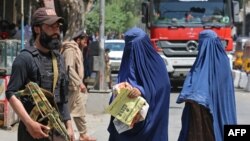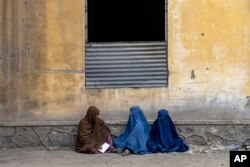The United Nation's top official in Afghanistan said Wednesday there have been no assurances from the Taliban that they will lift their "punishing restrictions" on the country's female population, placing a "question mark" over U.N. activities in the country.
"We have been given no explanations by the de facto authorities for this ban, and no assurance that it will be lifted," Roza Otunbayeva, head of the U.N. Assistance Mission in Afghanistan, told a meeting of the U.N. Security Council.
On April 5, the Taliban verbally informed the United Nations that an existing ban on women working for humanitarian organizations had been extended to include the United Nations. About 400 Afghan women work for the U.N. in the country.
Since then, the U.N. has ordered its female staff to work from home and for non-essential male staffers to also work remotely.
"We are steadfast — female national staff will not be replaced by male national staff as some de facto authorities have suggested," Otunbayeva said.
The Security Council condemned the Taliban's edict and called for its reversal in a resolution adopted unanimously on April 27.
The Taliban has been unmoved. Supreme Leader Hibatullah Akhundzada directed government spokespersons this month to emphasize the enforcement of Islamic law in their statements.
"The United States and the United Nations have held the entire world hostage, and nothing moves without their dictation," he told a meeting in the southern city of Kandahar, which is known as the birthplace of the Taliban. "The Islamic Emirate [Taliban] effectively controls all parts of Afghanistan, but non-Muslim and even Islamic countries refuse to recognize it."
Otunbayeva said the Taliban wants international recognition, but that means fulfilling responsibilities under the U.N. Charter, not working against its values.
"In my regular discussions with the de facto authorities, I am blunt about the obstacles they have created for themselves by the decrees and restrictions they have enacted, in particular against women and girls," she said. "We have conveyed to them that as long as these decrees are in place it is nearly impossible that their government will be recognized by members of the international community."
She said the bans, which include earlier ones preventing girls attending secondary schools and universities, visiting parks and gyms, and restricting their movements outside their homes, have taken a toll on women's mental and physical health.
Otunbayeva urged the Taliban to lift the restrictions so the U.N. can continue its full support to the Afghan people, more than 28 million of whom require some form of humanitarian assistance.
Ayaz Gul in Islamabad contributed to this report.












